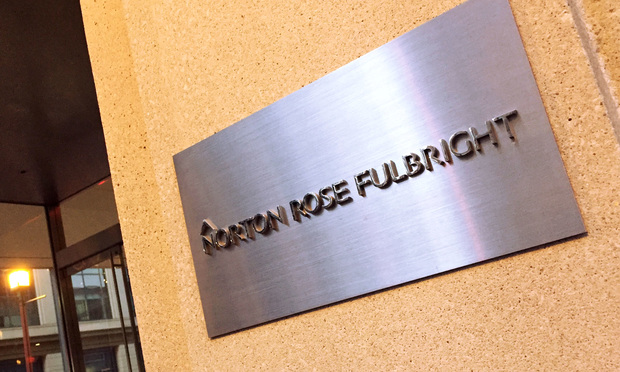Diversity Is Key, Norton Rose Fulbright's Incoming Australian Managing Partner Says
Alison Deitz wants to bring in lawyers from overseas offices, change graduate hiring processes, and examine the makeup of its partnership in order to improve diversity at the firm.
June 29, 2020 at 02:00 AM
5 minute read
 Photo: Diego M. Radzinschi/ALM
Photo: Diego M. Radzinschi/ALM
Alison Deitz, who takes over as Australia managing partner of global law firm Norton Rose Fulbright on Wednesday, wants to make diversity a hallmark of her tenure by bringing in lawyers from overseas offices, changing graduate hiring processes and examining the makeup of its partnership.
"I'm very driven to make sure that our partnership looks and feels and is diverse, not just in terms of gender but also diversity of thought," Deitz said in an interview. "We certainly want to look at the mix of our partners. It means less 'John Smiths' at the firm."
Deitz, a banking regulation partner at Norton Rose since 1998, was elected late last year to succeed long-term managing partner Wayne Spanner and to sit on the firm's global executive committee.
 Alison Deitz/courtesy photo
Alison Deitz/courtesy photoSince then, the firm has been in a handover period, but Deitz's transition to the new role has been disrupted by the COVID-19 crisis.
In fact, in late February she was riding in a taxi to the airport to fly to a global partners meeting in the U.S. when she received a call to tell her the meeting had been canceled.
"Rather than attending the global partners conference, here we were trying to deal with the pandemic, which really hit at that exact time," she said. "So it was an interesting baptism of fire, let's just say."
Even so, Deitz is already looking ahead and planning to leave a more diverse firm as her legacy.
She agrees that much of the profession is still dominated by lawyers of European ancestry, but said it is changing.
"Just as gender has washed through the profession, it's better now than it was. It's not where it needs to be. I think what you need to do is have a conscious focus on change," she said.
"And for us as a global firm, that may mean bringing people in from our other offices. That is one way of doing it. It may mean in our selection process for our grads and our lawyers, making sure we've got that lens on," she said.
She said the firm's mix of lawyers should replicate the jurisdictions in which it operates.
Globally, the firm has set a 40:40:20 gender diversity target, which requires 40% of partners to be female, 40% male and 20% "flexibility to be truly inclusive," she said.
In Australia, the firm has 133 partners and 546 other fee-earners. Some 32% of its partners and 69% of its senior associates are female.
Separately, the firm has several Indigenous law students who intern with the firm, which holds a minority-interest joint venture in Indigenous-owned law firm Jaramer Legal. It also has a Pride network to create an inclusive culture for LGBTIQ+ identifying staff.
"As a leader, I'm happy to be challenged," Deitz said. "We don't want to have people who are 'yes' people. We don't want to have replicas of ourselves."
It's about more than fairness—it's also about providing better solutions to clients, Deitz said.
"If you don't have that diversity of thought, you are not going to be able to provide holistic solutions to client problems," she said.
This played out during the height of the COVID-19 crisis, when clients sought advice on "real-world" problems, such as finding global solutions to a broken-down supply chain. "It's not just legal solutions; it's practical solutions," she said.
While the coronavirus crisis might have hit clients' businesses, it hasn't had much impact on Norton Rose Fulbright's billings from the current financial year, which ends June 31, Deitz said. She expects the firm will see an increase in its revenue over the previous year.
Transactional work in recent months has been down, she noted, but other areas, such as restructuring deals, have increased.
Even so, Deitz said the uncertain environment will continue for some time and she questioned what will happen to the Australian economy when government wage subsidies aimed at keeping companies afloat and people employed run out.
The market for legal services is "not necessarily" growing in Australia, she said, and Norton Rose Fulbright will use its global reach to service clients where other firms can't.
"What we see now is a great opportunity as firms are retreating because they're not able to travel and they don't have that network," she said. "We certainly can service our clients."
Other firms also claim to be international, but Norton Rose Fulbright has very strong North American and African practices, she said.
Meanwhile, the firm is pushing its government practice and it's restructuring and insolvency practice in Australia, areas that will continue to be busy. Clients are also seeking advice on some newer areas of legal practice, such as risk advisory, financial crime and cybersecurity.
In those areas, "clients are just hungry to understand what we can deliver to them and what we can offer and how we can help them through their problems," Deitz said.
This content has been archived. It is available through our partners, LexisNexis® and Bloomberg Law.
To view this content, please continue to their sites.
Not a Lexis Subscriber?
Subscribe Now
Not a Bloomberg Law Subscriber?
Subscribe Now
NOT FOR REPRINT
© 2025 ALM Global, LLC, All Rights Reserved. Request academic re-use from www.copyright.com. All other uses, submit a request to [email protected]. For more information visit Asset & Logo Licensing.
You Might Like
View All

Trio of Firms Act On Chinese Insurer Ping An's $1.7B Stake Acquisition In Healthcare Arm

King & Spalding’s Merger Marks Key Move in Saudi Arabia’s Legal Surge
3 minute read
RBG Holdings Suspends Trading After Weeks of Internal Strife and Financial Struggles
Law Firms Mentioned
Trending Stories
- 1Class Action Litigator Tapped to Lead Shook, Hardy & Bacon's Houston Office
- 2Arizona Supreme Court Presses Pause on KPMG's Bid to Deliver Legal Services
- 3Bill Would Consolidate Antitrust Enforcement Under DOJ
- 4Cornell Tech Expands Law, Technology and Entrepreneurship Masters of Law Program to Part Time Format
- 5Divided Eighth Circuit Sides With GE's Timely Removal of Indemnification Action to Federal Court
Who Got The Work
J. Brugh Lower of Gibbons has entered an appearance for industrial equipment supplier Devco Corporation in a pending trademark infringement lawsuit. The suit, accusing the defendant of selling knock-off Graco products, was filed Dec. 18 in New Jersey District Court by Rivkin Radler on behalf of Graco Inc. and Graco Minnesota. The case, assigned to U.S. District Judge Zahid N. Quraishi, is 3:24-cv-11294, Graco Inc. et al v. Devco Corporation.
Who Got The Work
Rebecca Maller-Stein and Kent A. Yalowitz of Arnold & Porter Kaye Scholer have entered their appearances for Hanaco Venture Capital and its executives, Lior Prosor and David Frankel, in a pending securities lawsuit. The action, filed on Dec. 24 in New York Southern District Court by Zell, Aron & Co. on behalf of Goldeneye Advisors, accuses the defendants of negligently and fraudulently managing the plaintiff's $1 million investment. The case, assigned to U.S. District Judge Vernon S. Broderick, is 1:24-cv-09918, Goldeneye Advisors, LLC v. Hanaco Venture Capital, Ltd. et al.
Who Got The Work
Attorneys from A&O Shearman has stepped in as defense counsel for Toronto-Dominion Bank and other defendants in a pending securities class action. The suit, filed Dec. 11 in New York Southern District Court by Bleichmar Fonti & Auld, accuses the defendants of concealing the bank's 'pervasive' deficiencies in regards to its compliance with the Bank Secrecy Act and the quality of its anti-money laundering controls. The case, assigned to U.S. District Judge Arun Subramanian, is 1:24-cv-09445, Gonzalez v. The Toronto-Dominion Bank et al.
Who Got The Work
Crown Castle International, a Pennsylvania company providing shared communications infrastructure, has turned to Luke D. Wolf of Gordon Rees Scully Mansukhani to fend off a pending breach-of-contract lawsuit. The court action, filed Nov. 25 in Michigan Eastern District Court by Hooper Hathaway PC on behalf of The Town Residences LLC, accuses Crown Castle of failing to transfer approximately $30,000 in utility payments from T-Mobile in breach of a roof-top lease and assignment agreement. The case, assigned to U.S. District Judge Susan K. Declercq, is 2:24-cv-13131, The Town Residences LLC v. T-Mobile US, Inc. et al.
Who Got The Work
Wilfred P. Coronato and Daniel M. Schwartz of McCarter & English have stepped in as defense counsel to Electrolux Home Products Inc. in a pending product liability lawsuit. The court action, filed Nov. 26 in New York Eastern District Court by Poulos Lopiccolo PC and Nagel Rice LLP on behalf of David Stern, alleges that the defendant's refrigerators’ drawers and shelving repeatedly break and fall apart within months after purchase. The case, assigned to U.S. District Judge Joan M. Azrack, is 2:24-cv-08204, Stern v. Electrolux Home Products, Inc.
Featured Firms
Law Offices of Gary Martin Hays & Associates, P.C.
(470) 294-1674
Law Offices of Mark E. Salomone
(857) 444-6468
Smith & Hassler
(713) 739-1250








